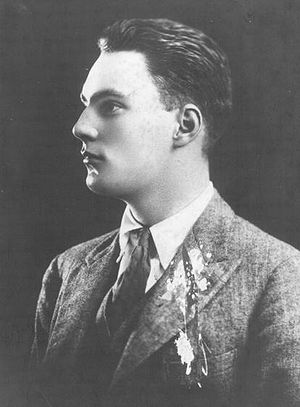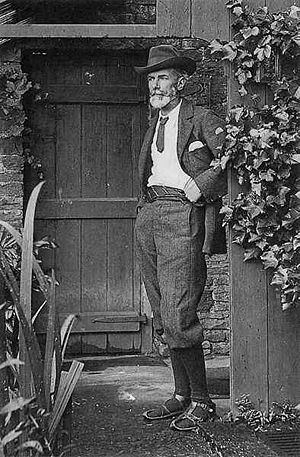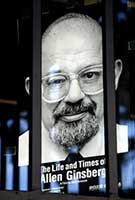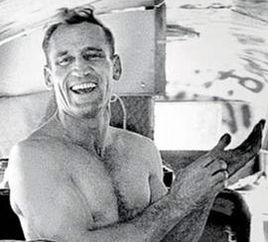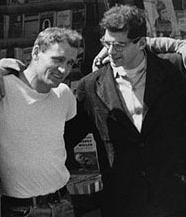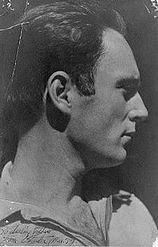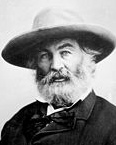Jonathan Ned Katz: "Gavin Arthur Recalls Edward Carpenter," 1967
Photo: Chester Alan ("Gavin") Arthur
In 1923, Gavin Arthur (born Chester Alan Arthur III), grandson of the 21st president of the United States, walked up a lane in Guildford, England, to a little, rose covered cottage. This was the lair of Edward Carpenter, writer and defender of women's emancipation, nature, animals, mysticism, sandals, socialism, and the "intermediate sex" (gay people).[1]
"Welcome, my boy!" exclaimed the 79-year-old Carpenter, hugging his handsome visitor and kissing him on both cheeks.
As Arthur later recalled, Carpenter's eyes were a "vivid sky blue, his face was copper, and his hair shining silver." Arthur remembered Carpenter as wearing sandals and rumpled tweed trousers. The angelic, bearded Carpenter smelled "like leaves in an autumn forest. A sort of seminal smell."
Taking the 21-year-old Arthur by the hand, Carpenter led him into his cozy living room, introducing him to two working men, his "comrades", George, about 60, and Ted, about 40. Over tea Carpenter read the letter Arthur brought from a woman friend with whom Carpenter had marched for woman suffrage.
Photo: Edward Carpenter, 1905
When Ted suggested a sunset walk, Arthur agreed. Ted was delighted, he said, that Arthur "had come to liven things up for the 'Old Man,' Arthur responded, "You can't imagine how I've loved him just through his books."
Then, suddenly, Ted suggested that Arthur sleep with Carpenter that night: "A young man's' electricity is so good for
recharging the batteries of the old." Arthur said he'd consider it a privilege.
Back at the house, Ted looked lovingly at Carpenter and said, "Chester wants to sleep with you tonight, Eddie -- Ain't you the lucky old dog?" Carpenter put his hand on Arthur's shoulder and led him to his bedroom.
Arthur's first version of this bedroom scene, published in 1966, speaks of "diffused ecstasy" and says there was no
orgasm in the sense of spilling seed." But a second version, dated 1967, is the sexiest historical document I know about -- a kind of classy historical porn.
In the second version, George and Ted go off to bed together. Arthur, sitting alone with Carpenter before a fire, asks about Walt Whitman. Carpenter idolized the American poet and had visited him during two trips to America, the first time staying with Whitman for a week.
Carpenter tells Arthur that Whitman had sexual relations with men as well as with a few women. "I suppose you slept with him?" Arthur asks nervously. Carpenter answers:
- Oh, yes--once in a while--he regarded it as the best way to get together with another man. He thought that people should "know" each other on the physical and emotional plane as well as the mental. And that the best part of comrade love was that there was no limit to the number of comrades one could have--whereas the very fact of engendering children made the man-woman relationship more singular.
Arthur asks how Whitman made love. "I will show you," Carpenter smiles. "Let us go up to bed."
Arthur and Carpenter lie naked "side by side on our backs, holding hands." Then Carpenter is holding Arthur's head in his hands, "making little growly noises, staring at me in the moonlight." Arthur thinks, "This is the laying on of hands. First Walt. Then Edward. Then me."
"The old man at my side was stroking my body with the most expert touch," wrote Arthur, who "just lay there in the moonlight that poured in at the window giving myself up to the loving old man's amorous petting." The memory continues:
- Every now and then he would bury his face in the hair of my chest, agitate a nipple with the end of his tongue, or breathe in deeply from my armpit. I had of course a throbbing erection, but he ignored it for a long time. Very gradually, however, he got nearer and nearer, first with his hand and later with his tongue, which was now flickering all over me like summer lightning. I stroked whatever part of him came within reach of my hand but felt instinctively that this was a one-sided affair, he being so old and I so young, and that he enjoyed petting me as much as I delighted in being petted. There are many possible relationships, and one misses so much if one limits oneself to one . . . sex or color or age.
- At last his hand was moving between my legs, and his tongue was in my belly button. And then when he was tickling my fundament just behind the balls and I could not hold it longer, his mouth closed just over the head of my penis, and I could feel my young vitality flowing info his old age.
Carpenter did not waste that "life-giving fluid," lecturing Arthur later: "It isn't the chemical ingredients that are so full of vitality -- it's the electrical content, like you get in milk if you get it direct from the cow -- so different from cold milk!"
Arthur says he "fell asleep like a child safe in father-mother arms, the arms of God. And dreamed of autumn woods with their seminal smell."
In 1967, at the request of poet Allen Ginsberg, Arthur presented Ginsberg with that second, sexually explicit version of his encounter with Carpenter. Arthur told Ginsberg he was sorry that the account still had to be kept anonymous, but his "work for humanity" would be ruined if his erotic comings and goings were publicized. Arthur died in 1972, at the age of 70.
In 1978, thanks to Ginsberg, the explicit version of Arthur's encounter with Carpenter appeared under Arthur's name in Gay Sunshine, a San Francisco literary journal. In a Gay Sunshine interview, Ginsberg spoke of Arthur and the beat rebel Neal Cassady. Ginsberg had had sex with Cassady, who'd had sex with Arthur, who'd had sex with Carpenter, who'd had sex with Whitman. That "line of transmission," Ginsberg thought, was "interesting . . . to have as part of the mythology"--a fabulous, historic daisy chain.[2]
Photos: Neal Cassady, Cassady and Ginsberg, Gavin Arthur
See also:
Allen Ginsberg: to Jonathan Ned Katz re Gavin Arthur, August 8, 1990
Notes
- ↑ Adapted by Jonathan Ned Katz from Katz's ""Splendor in the Leaves of Grass: Tracing the Links in a. Historic Daisy Chain." Advocate (January 2, 1990), 40-41. Katz stresses that the main title of the published piece was not his idea.
- ↑ Gavin Arthur's memoir is reprinted, with AIlen Ginsberg's interview., in the book Gay Sunshine Interviews, Vol. I (San Francisco: Gay Sunshine Press, 1978).
Bibliography on Arthur, Carpenter, and Whitman
to be added
Murray, Martin.
